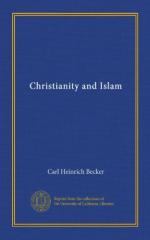of Christian asceticism among the classes which felt
a real interest in religion. Hence that surprising
similarity of views upon the problem of existence,
which we have now to outline. In details of outward
form great divergency is apparent. Christianity
possessed a clergy while Islam did not: yet the
force of Christian influence produced a priestly class
in Islam. It was a class acting not as mediator
between God and man through sacraments and mysteries,
but as moral leaders and legal experts; as such it
was no less important than the scribes under Judaism.
Unanimity among these scholars could produce decisions
no less binding than those of the Christian clergy
assembled in church councils. They are representatives
of the congregation which “has no unanimity,
for such would be an error.” Islam naturally
preferred to adopt unanimous conclusions in silence
rather than to vote in assemblies. As a matter
of fact a body of orthodox opinion was developed by
this means with no less success than in Christendom.
Any agreement which the quiet work of the scholars
had secured upon any question was ratified by God
and was thus irrevocably and eternally binding.
For instance, the proclamation to the faithful of
new ideas upon the exposition of the Qoran or of tradition
was absolutely forbidden; the scholars, in other words
the clergy, had convinced themselves, by the fact
of their unanimity upon the point, that the customary
and traditional mode of exposition was the one pleasing
to God. Ideas of this kind naturally remind us
of Roman Catholic practice. The influence of
Eastern Christianity upon Islam is undoubtedly visible
here. This influence could not in the face of
Muhammedan tradition and custom, create an organised
clergy, but it produced a clerical class to guard
religious thought, and as religion spread, to supervise
thought of every kind.
Christianity again condemned marriage, though it eventually
agreed to a compromise sanctifying this tie; Islam,
on the contrary, found in the Qoran the text “Ye
that are unmarried shall marry” (24, 32).
In the face of so clear a statement, the condemnation
of marriage, which in any case was contrary to the
whole spirit of the Qoran, could not be maintained.
Thus the Muhammedan tradition contains numerous sayings
in support of marriage. “A childless house
contains no blessing”: “the breath
of a son is as the breath of Paradise”; “when
a man looks upon his wife (in love) and she upon him,
God looks down in mercy upon them both.”
“Two prayers of a married man are more precious
in the sight of God than seventy of a bachelor.”
With many similar variations upon the theme, Muhammed
is said to have urged marriage upon his followers.
On the other hand an almost equally numerous body
of warnings against marriage exists, also issued by
Muhammed. I know no instance of direct prohibition,
but serious admonitions are found which usually take
the form of denunciation of the female sex and were
early interpreted as warnings by tradition. “Fear




